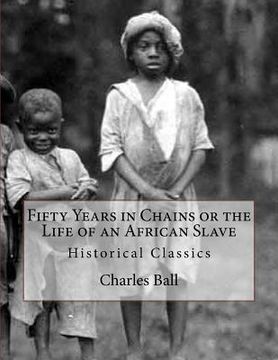Fifty Years in Chains or the Life of an African Slave: Historical Classics (en Inglés)
Reseña del libro "Fifty Years in Chains or the Life of an African Slave: Historical Classics (en Inglés)"
In 1805 he was sold to a South Carolinian cotton planter, thus estranged from his wife and children who remained in Maryland. After several escapes and recaptures, he wrote his autobiography with the help of the white lawyer Isaac Fisher. Charles Ball was eventually married and had children and in 1805, he was sold to a Georgia trader without warning and was once again separated from his family. He eventually escaped from slavery and settled in Pennsylvania where he wrote his memoir. Ball's history/memoir is a fascinating realistic account of the life of slaves and slave-owners in the early 19th century, which he describes as "one long waste, barren desert, of cheerless, hopeless, lifeless slavery; to be varied only by the pangs of hunger, and the stings of the lash". Recalling the brutal conditions in slave life, he describes the heartache of having family members sold away-as his mother and father were, and as he was separated from his wife and children, taken south chained to a line of other slaves. In one long account, Ball relates the story of a fellow slave who had been captured in Africa, and we learn of the horrific conditions on slave ships bound for the West. On this slave's journey, he recounts that 1/3 of the slaves on the ship died during the passage to Charleston, South Carolina. Ball also provides detailed accounts of the environments he lived in the U.S., including the wide destruction of the arable land created by the over-planting of tobacco, and descriptions of other flora and fauna of the southern states; the terrible diet of slave life, with each given only a peck of dry corn each week, supplemented at times with a dried fish or bite of meat; the toil of slave life, with work from dawn to dusk much of the year, and with many slaves working with absolutely no clothes on their backs; of the differences between the lives of slaves and slave owners in the northern states of Maryland and Delaware, through the uplands and tidewater districts of Virginia, and into the deep south and the Carolinas, which he regarded with "the greatest dread;" suicide among slaves, which he claims was more common than is generally known--"What is life worth, amidst hunger, nakedness, and excessive toil," Ball writes, "under the continuously uplifted lash?"; and how some slave owners and their family members were in fact kind and accommodating with slaves, while others-in fact, mostly slave overseers, one who Ball describes as "a tiger in human form" (54)--were brutal and cruel, wielding whips and other weapons. Ball also holds forth about the development of the cotton gin and how that invention affected slavery. Ball also served the United States in the War of 1812. By 1813, he had enlisted in Commodore Joshua Barney's Chesapeake Bay Flotilla and fought at the Battle of Bladensburg on August 24, 1814. An excerpt from his account of the battle, which was a resounding defeat for the Americans: "I stood at my gun, until the Commodore was shot down, when he ordered us to retreat, as I was told by the officer who commanded our gun. If the militia regiments, that lay upon our right and left, could have been brought to charge the British, in close fight, as they crossed the bridge, we should have killed or taken the whole of them in a short time; but the militia ran like sheep chased by dogs."

